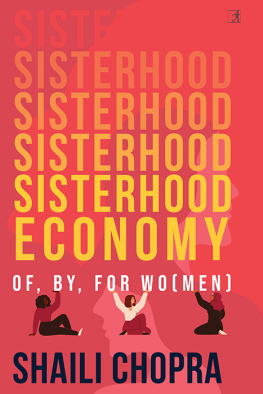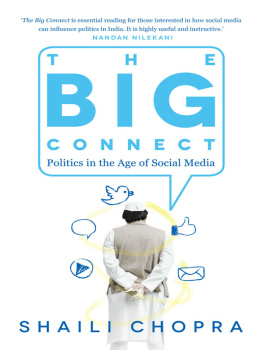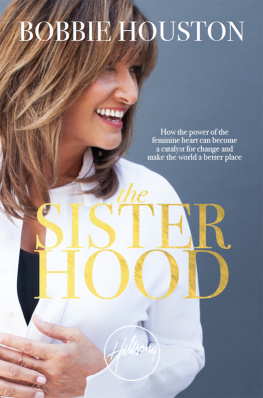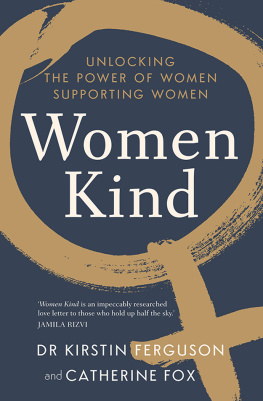
Sisterhood Economy
Sisterhood Economy
Of, By, For Wo(men)
SHAILI CHOPRA

For Abeer and Bani
Introduction
W hen I left the television studio to become an entrepreneur, nearly everyone I knew thought I had really lost my mind to quit a job that put me in front of global audiences, to one of hiding. I got calls from all my friendsjournalists, bankers, politicians, CEOs, well-wishers, familyasking me Who retires at 30? From being a national TV anchor?
I wanted to tell stories that I couldnt find around me. Stories of women. But no one understood why that was a plan. What a niche you have chosen, said one. At approximately 50% of a countrys population, women were being called a segment and that just didnt go down well for me. Its like we are willing to ignore one half of our talent because it didnt wear a black suit?
Somehow, the inspiration came in a weird package and triggered change inside me in 2011. I landed on the early flight into Bangalore. This was an interview I had always wanted to do. Warren Buffett was on his first trip to India and I, a primetime television journalist, wanted to make a real impression on him. As a woman covering business news, CEOs, and the next big deal, Buffett perhaps epitomised the prize among interviews as it were. He spoke about all the right things and I asked all the tough questions. But I came back asking myself if I was made to just interview the rich and famous. I mean, this was it. I was telling stories of those who had made it. Something about doing that interview switched a button inside me. Where were the people who hadnt made it? Buffett was the 276th man I had interviewed. Where were the women?
It was a weird moment because journalists go from stories and interviews to their next big ones. And here I was, feeling bereft of inspiration and ideas of being in this moment in journalism. So, I literally stood up in the newsroom and askedarent we bored of stories of the same guys making it bigger and bigger every single day?
Many bobbed their heads and gave me an awkward smile, but my message box poured over with yeses. And so I put in my papers and my resignation read two words: am off.
Like many other women on earth, my head was bustling with self-doubt and questions as I set course on something new. This was 2012. I had no idea what I was going to build or how. But I knew it would be about women. I took a little smartphone and went around interviewing young, old, quiet, loud, meek, confident, charming, unsure women from all walks of life. What have I done to be interviewed? nearly every woman said, with a side of guilt and self-doubt.
Arent we conditioned to do that? I couldnt possibly start a revolution alone. Or could I? Our worlds were shaped by a narrative that went mostly like the films we watch. Theres always the hero who rescued the woman and changed her future. At home, you could either have an opinion or a good relationship with your parents. At college it was so amaze that your parents even let you study for a masters. Discussing money was blasphemous because money would give women the choice of leaving loveless, abusive marriages. There was a world order and shaking it couldnt be a womans job. Because it was already prescribed and disruptors arent anyones favourites.
In the course of my interviews, I met women from everywhere. Malti was a housemaid who worked three homes and ran her household after her husbanda mill worker in Mumbaidecided to give up on working at 29 to live off her earnings. Noor, 33, was shortchanged in marriage because she was forced to fund her husbands drunken nights. Prabha, 41, was leading a private equity firm but entirely invisible because it pays to have guys on your team and not be the face of it. Tripti, 26, had had twins and was judged for returning to work in ten days because she wanted to work while the babies slept, what else was there to do anyway? Simran, 25, got her husband to join her business because raising money was not possible for her alone.
In 2012, a young girl was gruesomely raped in India. It changed many of us. It completely broke me down. Rape wasnt a womans issue, it was a national concern. It took the media that severe a case, and one that occured in the heart of the capital rather than the forgotten towns and villages of our country, to put womens issues on the front pages. This needed to change.
We talk about how many women were raped, not about how many men raped women. We talk of how many girls were harassed, but not about how many boys harass girls. We talk of violence against women, we forget to mention who it is perpetrated by and how its something against women.
With all these in my recesses, I took a leap of faith and started a platform for women, SheThePeople, seven years ago. Yet I felt I needed to justify it. I spent days and hours explaining to people (including women) why women needed a platform of their own, a safe space to discuss life, work, insecurities, and more. Women need to stop justifying themselves. But even I did. It was so deep-rooted.
I used basic math and picked numbers to drive my inspiration. Indian women are almost 50% of Indias population. As a ratio of the worlds population, that is 9%. To give you an idea, women in India are three times the size of Brazil, five times the size of Japan and twice the size of the United States of America. We women are not a number, we are a force. And not enough people are telling us this. We arent telling ourselves this enough.
Heres something to think about. We are not just half of the population. We produce and raise the other half. We are half the vote in our country. So we should be at least half the voice. But we are not. Why are we absent from the headlines? Why dont we know the amazing stories of so many women? Why do only one in five women work? Thats what I wanted to get behind.
As I started work on this book, The Sisterhood of unpaid care and domestic work has exploded. Both for women and men. But even before COVID-19, women spent an average of 4.1 hours per day performing unpaid work, while men spent 1.7 hoursthat means women did three times more unpaid care work than men, worldwide.
The pandemic saw urban Indian men spending more time in the kitchen. It was an eye-opener for many in terms of the quantum of chores that needed to be done when you stay at home. While women have been owning the workspaces too, it was time men show the same gesture at home. We need to get rid of the stereotype that men can earn well but not cook while women can cook well but not earn. Earning and cooking are basic survival skills. But as COVID-19 restrictions wore off, women got back to status quo, and most men who experimented with household chores let them remain on Instagram timelines and no more.
Womens issues are everyones problems. In fact, we also need to think of women outside of their problems and celebrate their achievements. Big, small, tinyall of them. Another inspiration for me to tell stories about women was how we have for years reduced them to those who needed to be empowered giving the other side some sort of unwritten responsibility to fix things for women. I dont think someone else has to give women power. They have it, we just enable them to discover it.
How can a country progress if nearly half its population is not working? As an economics student, I asked myselfwhat holds us back from recognising that women are a big (and absent) source of progress and outcomes?
This book brings together stories of women and their changing realities. Women talk about themselves, and their journeys through workplaces, within families, through singlehood, divorce, successes, through feelings of loneliness, sexual pleasure, breakdown, rising up, and more. Through the many chapters, it asks some fundamental questions.
Next page






